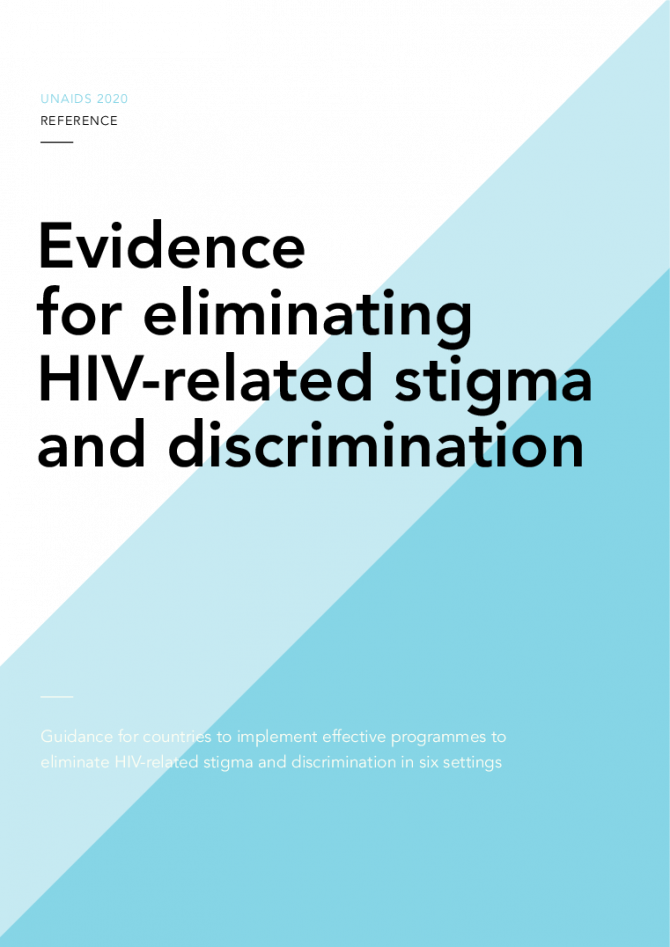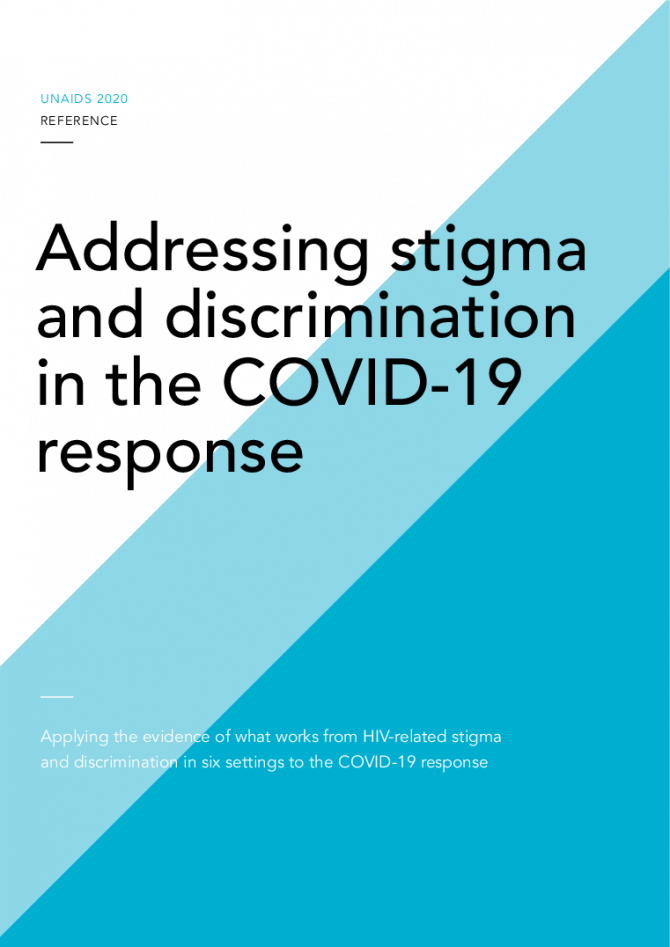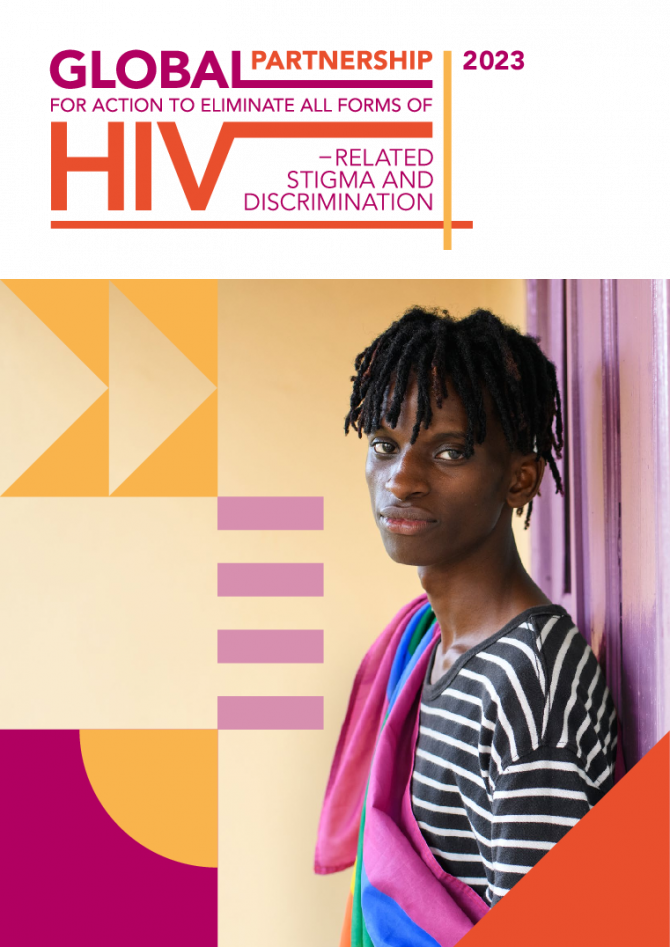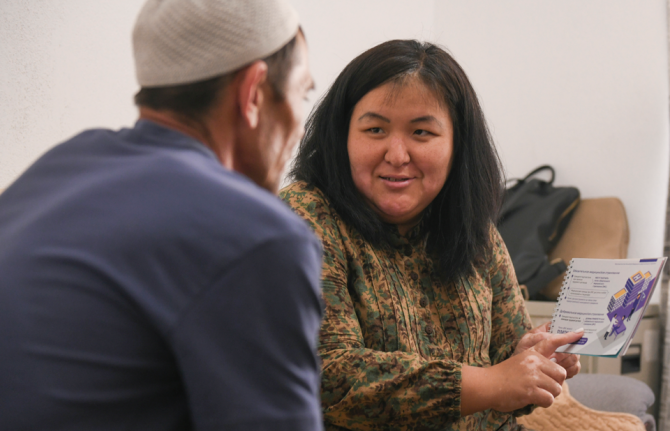
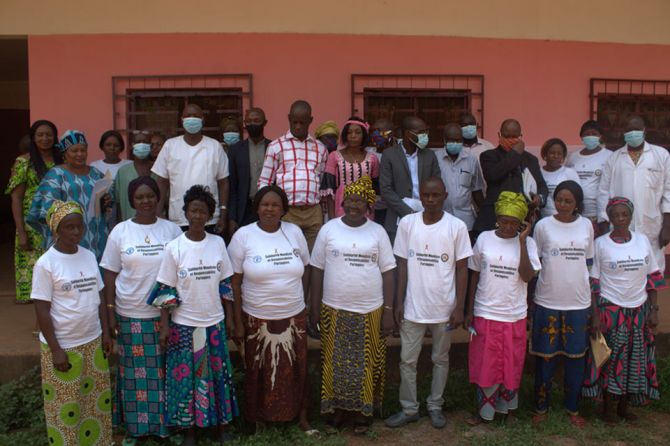
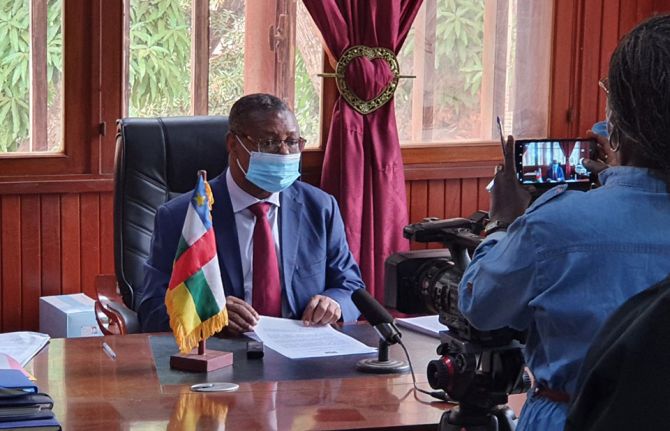
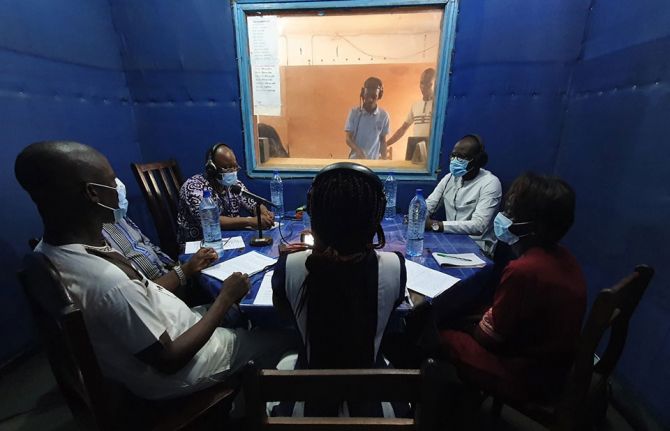
Feature Story
Central African Republic marks Zero Discrimination Day
02 March 2021
02 March 2021 02 March 2021On 1 March, people around the world join together to celebrate Zero Discrimination Day, which this year highlighted the urgent need to take action to end inequalities.
In recent years, the Central African Republic has made the reduction of health inequalities a national priority. In mid-2019, 10 priority areas towards universal health coverage were established. These include the objective of ensuring that every citizen in the country has access to a health centre within 5 km of his or her home.
The country was the first to join the Global Partnership for Action to Eliminate all Forms of HIV-Related Stigma and Discrimination, which through harnessing the combined power of, and using the unique skills of, governments, civil society and the United Nations aims to consign HIV-related stigma and discrimination to history.
To mark Zero Discrimination Day this year, the country organized several activities ahead of and during the day. A declaration recalling the government’s commitment to non-discrimination and equality was issued by the Minister of Health and Population on television and radio. “It is only by addressing inequalities that we can achieve the Sustainable Development Goals, including those related to well-being and health for all,” said Pierre Somse, the Minister of Health and Population.
Recent studies show that inequality and stigma are major obstacles to access to health services. For example, more than 80% of people living with HIV in the country report having experienced discrimination or stigma. “These challenges are further compounded by conflicts and attacks on populations and health personnel that deprive hundreds of thousands of our citizens of their rights, including the right to life, dignity and health,” Mr Somse added.
A civil society consultation was organized to flesh out the priorities for the elimination of stigma and discrimination in the country. A round-table meeting was also held on a national network of human rights journalists radio programme to raise awareness on the negative impact of stigma and discrimination as a major barrier to people taking up HIV prevention, treatment, care and support services. Speaking on the programme, Aminata Adoum, of the National Association of Women Lawyers, highlighted the work of her organization in supporting women living with HIV against discrimination and violence.
On Zero Discrimination Day 2020, health professionals, including professional organizations of doctors, nurses and midwives, as well as patients’ associations, signed a National Charter for Quality of Care and Patients’ Rights that sets the principles of humanism, ethics and respect for dignity to guide relations between patients and health-care providers. This year, the patients’ charter was posted in health facilities in the capital city, Bangui, and dedicated sensitization sessions on the charter took place for medical staff in two major health-care centres in the capital.
“This Zero Discrimination Day campaign is part of a comprehensive set of priority activities to address human rights barriers to HIV services that the country will be implementing over the next three years, including community-led monitoring of human rights violations, know your rights education, legal services, the development of anti-discrimination law and engagement with community leaders, legislators and opinion-makers,” said Patrick Eba, the UNAIDS Country Director for the Central African Republic.
Region/country
Related

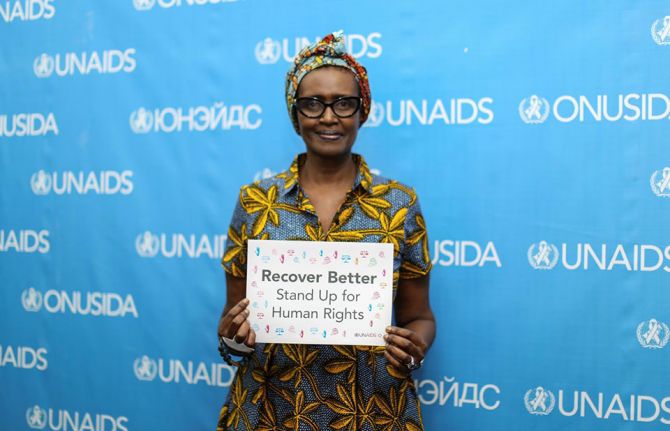
Press Statement
UNAIDS calls on countries to put human rights first to beat pandemics
10 December 2020 10 December 2020Human Rights Day message from Winnie Byanyima, UNAIDS Executive Director
I invite you to join us on Human Rights Day, and every day, as we take action to reform our systems, to recover better and to fight for everyone’s rights.
The COVID-19 crisis has demonstrated once again how quickly rights violations can arise in an emergency. Inequalities that have too long been ignored were laid bare and exacerbated during the response to the pandemic. And yet we have learned from the AIDS response that it is only where rights are respected, protected and fulfilled that countries can make progress against an epidemic and build fairer societies.
Sex workers, gay men and other men who have sex with men, transgender people and people who use drugs were often targeted by law enforcement during lockdowns, exposed to high rates of violence, omitted from social protection and financial support mechanisms and denied access to health services because community-led organizations were frequently deemed as non-essential.
There are 69 countries that still criminalize same-sex sexual relations, 92 that criminalize HIV transmission, exposure and non-disclosure and 32 that criminalize transgender people. Almost every country in the world continues to criminalize drug use and aspects of sex work. If it wasn’t clear before, it should be now—this is not just an HIV issue, but one of fundamental equality and human rights.
The criminal law is a heavy and blunt instrument. It must be used with great care and sparingly. Used badly, it can harm when we need to help, it can oppress when we need to enable, and far from being neutral, it creates and amplifies existing discrimination and inequalities.
We need to transform our justice systems and change our laws. The law should work for everyone and protect everyone. Law reform can take time, but we can already act now to put a moratorium on arrests where criminal laws and their enforcement breach international human rights norms.
On Human Rights Day, let us commit to ending the inequalities and injustices that fuel AIDS and other pandemics.
UNAIDS is one of the founding members of the Global Partnership for Action to Eliminate HIV-Related Stigma and Discrimination, along with the United Nations Development Programme, UN Women, the Global Network of People Living with HIV and now the Global Fund to Fight AIDS, Tuberculosis and Malaria. This year, 18 countries have joined the partnership. Next year we will be expanding further.
Our work
Documents
Evidence for eliminating HIV-related stigma and discrimination — Guidance for countries to implement effective programmes to eliminate HIV-related stigma and discrimination in six settings
24 April 2020
This report reviews the latest evidence on what works to reduce HIV-related stigma and discrimination through key programmes to reduce stigma and discrimination and increase access to justice in the six settings of focus for the Global Partnership. It includes guidance for national governments and key stakeholders on how stigma and discrimination harm; how the stigmatization process operates and how we can stop it; key principles of stigma- and discrimination-reduction efforts; an overview of common intervention approaches; recommendations based on the latest evidence for reducing HIV-related stigma and discrimination in the six settings; and an overview of considerations for monitoring the success of the programmatic interventions recommended for each setting.
Documents
Addressing stigma and discrimination in the COVID-19 response — Applying the evidence of what works from HIV-related stigma and discrimination in six settings to the COVID-19 response
08 October 2020
The UNAIDS Secretariat, as co-convener of the Global Partnership for Action to Eliminate all Forms of HIV-related Stigma and Discrimination (Global Partnership), was tasked to develop this brief, based on consultations with its Technical Working Group (TWG), to provide evidence-informed guidance to countries on the intersection of stigma related to HIV and COVID-19 in national responses. UNAIDS thanks co-conveners and TWG members for participating in consultations, contributing their time and providing expert recommendations. This document is also available in Portuguese
Documents
Global Partnership for Action to Eliminate All Forms of HIV-Related Stigma and Discrimination
15 June 2023
Without addressing HIV-related stigma and discrimination, the world will not achieve the goal of ending AIDS as a public health threat by 2030. Related: Operational guidance with checklist for tracking progress at country level. This document is also available in Portuguese.

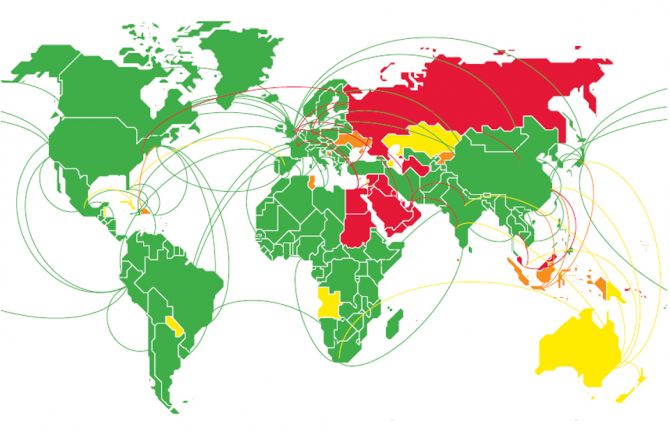
Press Release
UNAIDS and UNDP call on 48* countries and territories to remove all HIV-related travel restrictions
27 June 2019 27 June 2019New data show that in 2019 around 48* countries and territories still have restrictions that include mandatory HIV testing and disclosure as part of requirements for entry, residence, work and/or study permits
GENEVA, 27 June 2019—UNAIDS and the United Nations Development Programme (UNDP) are urging countries to keep the promises made in the 2016 United Nations Political Declaration on Ending AIDS to remove all forms of HIV-related travel restrictions. Travel restrictions based on real or perceived HIV status are discriminatory, prevent people from accessing HIV services and propagate stigma and discrimination. Since 2015, four countries have taken steps to lift their HIV-related travel restrictions—Belarus, Lithuania, the Republic of Korea and Uzbekistan.
“Travel restrictions on the basis of HIV status violate human rights and are not effective in achieving the public health goal of preventing HIV transmission,” said Gunilla Carlsson, UNAIDS Executive Director, a.i. “UNAIDS calls on all countries that still have HIV-related travel restrictions to remove them.”
“HIV-related travel restrictions fuel exclusion and intolerance by fostering the dangerous and false idea that people on the move spread disease,” said Mandeep Dhaliwal, Director of UNDP’s HIV, Health and Development Group. “The 2018 Supplement of the Global Commission on HIV and the Law was unequivocal in its findings that these policies are counterproductive to effective AIDS responses.”
Out of the 48 countries and territories that maintain restrictions, at least 30 still impose bans on entry or stay and residence based on HIV status and 19 deport non-nationals on the grounds of their HIV status. Other countries and territories may require an HIV test or diagnosis as a requirement for a study, work or entry visa. The majority of countries that retain travel restrictions are in the Middle East and North Africa, but many countries in Asia and the Pacific and eastern Europe and central Asia also impose restrictions.
“HIV-related travel restrictions violate human rights and stimulate stigma and discrimination. They do not decrease the transmission of HIV and are based on moralistic notions of people living with HIV and key populations. It is truly incomprehensible that HIV-related entry and residency restrictions still exist,” said Rico Gustav, Executive Director of the Global Network of People Living with HIV.
The Human Rights Council, meeting in Geneva, Switzerland, this week for its 41st session, has consistently drawn the attention of the international community to, and raised awareness on, the importance of promoting human rights in the response to HIV, most recently in its 5 July 2018 resolution on human rights in the context of HIV.
“Policies requiring compulsory tests for HIV to impose travel restrictions are not based on scientific evidence, are harmful to the enjoyment of human rights and perpetuate discrimination and stigma,” said Dainius Pūras, Special Rapporteur on the right of everyone to the enjoyment of the highest attainable standard of health. “They are a direct barrier to accessing health care and therefore ineffective in terms of public health. I call on states to abolish discriminatory policies that require mandatory testing and impose travel restrictions based on HIV status.”
The new data compiled by UNAIDS include for the first time an analysis of the kinds of travel restrictions imposed by countries and territories and include cases in which people are forced to take a test to renew a residency permit. The data were validated with Member States through their permanent missions to the United Nations.
UNAIDS and UNDP, as the convenor of the Joint Programme’s work on human rights, stigma and discrimination, are continuing to work with partners, governments and civil society organizations to change all laws that restrict travel based on HIV status as part of the Global Partnership for Action to Eliminate all Forms of HIV-Related Stigma and Discrimination. This is a partnership of United Nations Member States, United Nations entities, civil society and the private and academic sectors for catalysing efforts in countries to implement and scale up programmes and improve shared responsibility and accountability for ending HIV-related stigma and discrimination.
*The 48 countries and territories that still have some form of HIV related travel restriction are: Angola, Aruba, Australia, Azerbaijan, Bahrain, Belize, Bosnia and Herzegovina, Brunei Darussalam, Cayman Islands, Cook Islands, Cuba, Dominican Republic, Egypt, Indonesia, Iraq, Israel, Jordan, Kazakhstan, Kuwait, Kyrgyzstan, Lebanon, Malaysia, Maldives, Marshall Islands, Mauritius, New Zealand, Oman, Palau, Papua New Guinea, Paraguay, Qatar, Russian Federation, Saint Kitts and Nevis, Samoa, Saudi Arabia, Saint Vincent and the Grenadines, Singapore, Solomon Islands, Sudan, Syrian Arab Republic, Tonga, Tunisia, Turkmenistan, Turks and Caicos, Tuvalu, Ukraine, United Arab Emirates and Yemen.
UNAIDS
The Joint United Nations Programme on HIV/AIDS (UNAIDS) leads and inspires the world to achieve its shared vision of zero new HIV infections, zero discrimination and zero AIDS-related deaths. UNAIDS unites the efforts of 11 UN organizations—UNHCR, UNICEF, WFP, UNDP, UNFPA, UNODC, UN Women, ILO, UNESCO, WHO and the World Bank—and works closely with global and national partners towards ending the AIDS epidemic by 2030 as part of the Sustainable Development Goals. Learn more at unaids.org and connect with us on Facebook, Twitter, Instagram and YouTube.
Contact
UNAIDS GenevaAnne-Claire Guichard
tel. +41 22 791 2321
guicharda@unaids.org
UNAIDS Media
tel. +41 22 791 42 37
communications@unaids.org
Press centre
Download the printable version (PDF)

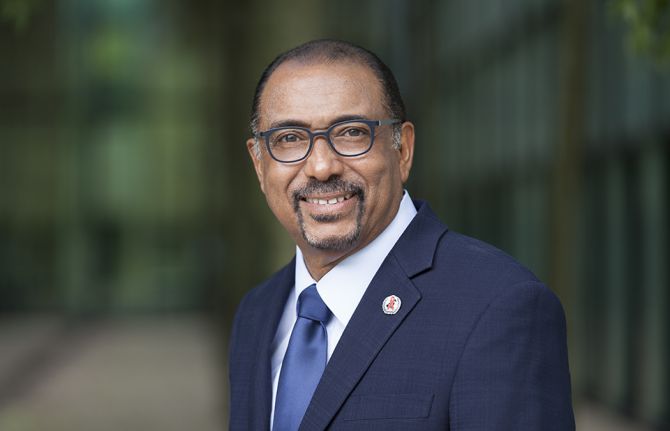
Press Statement
Message from the UNAIDS Executive Director on Zero Discrimination Day
01 March 2019 01 March 2019On 1 March, Zero Discrimination Day, we celebrate the advocacy and activism that brings the world closer to zero discrimination and the actions and laws that help to ensure that people can live with dignity.
My call this year is focused on changing discriminatory laws and practices that block people from accessing health and other life-saving services.
Laws should protect, not reject. Every person has an equal right to be treated with dignity and respect.
In 2019, I call on countries to support the Global Partnership for Action to Eliminate all Forms of HIV-Related Stigma and Discrimination, launched by the Global Network of People Living with HIV, UNAIDS, the United Nations Development Programme, UN Women and the UNAIDS Programme Coordinating Board nongovernmental organization delegation on 10 December 2018, Human Rights Day. Civil society organizations, networks of people living with HIV and key populations are leading with organizations in the United Nations system—the World Food Programme, the United Nations Development Programme, UN WOMEN, the International Labour Organization, the United Nations Educational, Scientific and Cultural Organization and the World Health Organization—to provide guidance to countries working to respond to stigma and discrimination.
The work of the global partnership will focus on six key settings—health-care settings, the workplace, the education system, the justice system, households and humanitarian and emergency settings.
Zero discrimination is essential to achieving universal health coverage and the Sustainable Development Goals. All over the world, people are unable to live with dignity because of laws and practices that discriminate. For example:
- At least 20 countries worldwide still impose travel restrictions on people living with HIV.
- In 29 countries women require the consent of their spouse or partner to access sexual and reproductive health services.
Laws must protect, not cause harm. All countries must carefully review their laws and policies to ensure equality and protection for all people, with no exceptions.
On Zero Discrimination Day, and every day, let’s act together to change discriminatory laws.
Michel Sidibé
Executive Director of UNAIDS
Under-Secretary-General of the United Nations
UNAIDS
The Joint United Nations Programme on HIV/AIDS (UNAIDS) leads and inspires the world to achieve its shared vision of zero new HIV infections, zero discrimination and zero AIDS-related deaths. UNAIDS unites the efforts of 11 UN organizations—UNHCR, UNICEF, WFP, UNDP, UNFPA, UNODC, UN Women, ILO, UNESCO, WHO and the World Bank—and works closely with global and national partners towards ending the AIDS epidemic by 2030 as part of the Sustainable Development Goals. Learn more at unaids.org and connect with us on Facebook, Twitter, Instagram and YouTube.
Contact
UNAIDS GenevaAnne-Claire Guichard
tel. +41 22 791 2321
guicharda@unaids.org
UNAIDS Media
tel. +41 22 791 42 37
communications@unaids.org
Press centre
Download the printable version (PDF)


Press Release
UNAIDS urges action to change discriminatory laws in order to restore dignity and respect and save lives
01 March 2019 01 March 2019On Zero Discrimination Day, UNAIDS calls on countries to examine discriminatory provisions in their laws and policies and make positive changes to ensure equality, inclusion and protection
GENEVA, 1 March 2019—In 2018, a number of countries made landmark decisions to change discriminatory laws and bills. The Supreme Court of India struck down Section 377 of the Penal Code, which criminalized same-sex sexual relations, the Philippines lowered the age of consent for voluntary HIV testing without the need to obtain consent from a parent or guardian to 15 years and Malawi removed provisions from a draft bill that would have criminalized HIV non-disclosure, exposure and transmission.
On Zero Discrimination Day, UNAIDS recalls the equal dignity and worth of every person, as enshrined in the Universal Declaration of Human Rights, and is calling for action to change discriminatory laws and practices, which are a significant barrier for access to health and other services.
“Human rights violations are happening all over the world because of discriminatory laws and practices,” said Michel Sidibé, Executive Director of UNAIDS. “Laws must protect, not cause harm. All countries must carefully examine their laws and policies in order to ensure equality and protection for all people, without exception.”
Raising awareness, mobilizing and taking action are essential. On Zero Discrimination Day, UNAIDS is proposing specific actions that individuals, civil society organizations, parliamentarians and donor organizations can take to change discriminatory laws. These range from being an ally to someone affected by a discriminatory law to joining a nongovernmental organization, tabling amendments to laws and calling for reviews of legislation.
Making a positive change is possible and there are many ways a law can be amended or abolished. These include:
- Reforming or removing laws through parliamentary processes and the votes of parliamentarians.
- Raising awareness among parliamentarians is therefore essential, as was done in the revision of the HIV laws in the Philippines and bills in Malawi.
- In many countries, courts have the power to strike down laws that are discriminatory. This can be done if an individual or organization affected by the law takes legal action and wins the case for change.
- The case of India’s Supreme Court, which removed Section 377 in 2018, was a striking example.
- In some countries, people or politicians can propose law reform through a petition and request a national vote or referendum.
- This is a standard method of legislating in Switzerland.
UNAIDS has identified a range of laws that are discriminatory, impede access to health and social services, restrict freedom of movement and violate human rights.
In 2018:
- At least 20 countries imposed travel restrictions of some form against people living with HIV.
- Around 29 countries reported that they require the consent of a woman’s husband or partner to access sexual and reproductive health services.
- Fifty-nine countries reported mandatory HIV testing for marriage, work or residence permits or for certain groups of people in the law, regulations or policies.
- Seventeen countries criminalized transgender people.
- Forty-five countries had laws that impose the need for parental consent for adolescents and young people below 18 years to access HIV testing services.
- Thirty-three countries imposed the death penalty for drug offences in law.
- Same-sex sexual relations were criminalized in at least 67 countries and territories worldwide.
UNAIDS is actively working with United Nations partners, governments and civil society organizations to change those laws as part of the Global Partnership for Action to Eliminate all Forms of HIV-Related Stigma and Discrimination.
Zero Discrimination Day campaign 2019—act to change laws that discriminate.
UNAIDS
The Joint United Nations Programme on HIV/AIDS (UNAIDS) leads and inspires the world to achieve its shared vision of zero new HIV infections, zero discrimination and zero AIDS-related deaths. UNAIDS unites the efforts of 11 UN organizations—UNHCR, UNICEF, WFP, UNDP, UNFPA, UNODC, UN Women, ILO, UNESCO, WHO and the World Bank—and works closely with global and national partners towards ending the AIDS epidemic by 2030 as part of the Sustainable Development Goals. Learn more at unaids.org and connect with us on Facebook, Twitter, Instagram and YouTube.
Contact
UNAIDS GenevaAnne-Claire Guichard
tel. +41 22 791 2321
guicharda@unaids.org
UNAIDS Media
tel. +41 22 791 42 37
communications@unaids.org
Press centre
Download the printable version (PDF)

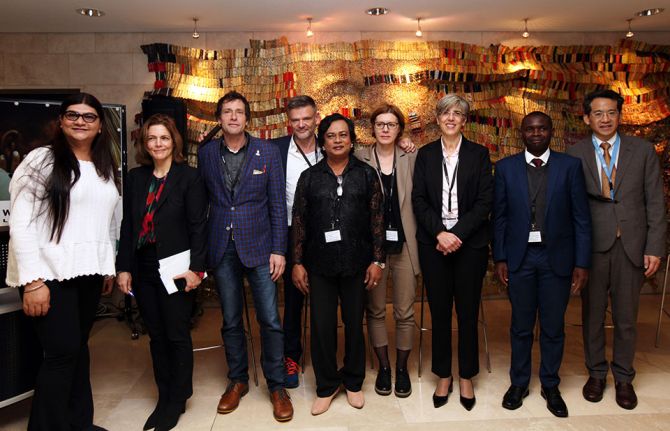

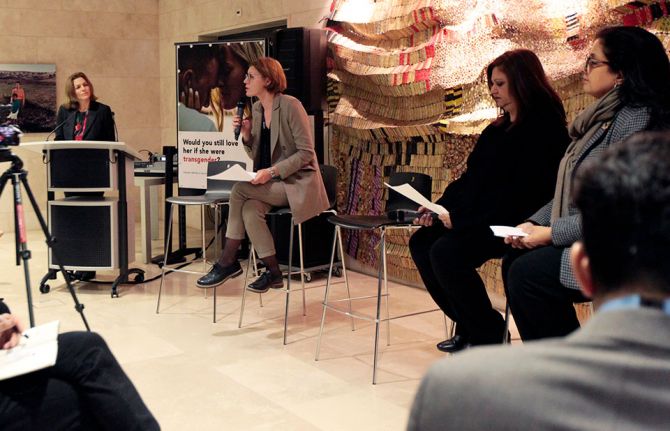
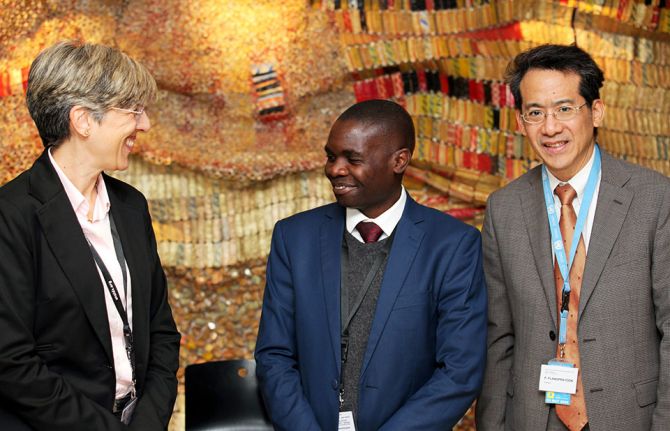
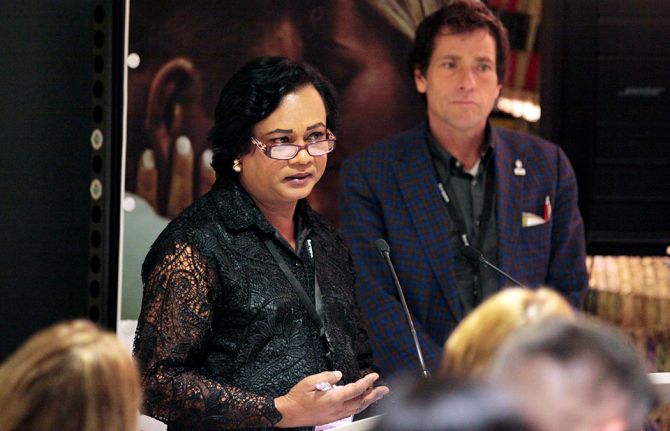
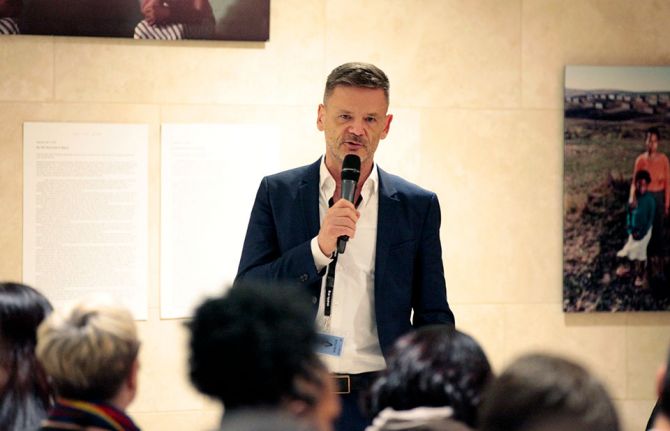
Feature Story
Launch of a global partnership to eliminate HIV-related stigma and discrimination
10 December 2018
10 December 2018 10 December 2018Despite the existence of human rights obligations and policy commitments, HIV-related stigma and discrimination continues to be widespread around the world and in all sectors of society.
Following a call from civil society in 2017 to accelerate and scale up action to address stigma and discrimination, UNAIDS, UN Women, the United Nations Development Programme and the Global Network of People Living with HIV (GNP+) agreed to co-convene the Global Partnership to Eliminate All Forms of HIV-Related Stigma and Discrimination.
The global partnership was launched on 10 December on the 70th anniversary of the adoption of the Universal Declaration of Human Rights, during an event in Geneva, Switzerland. The panel of people speaking at the event included Phanpob Plangprayoon, the Deputy Permanent Representative of Thailand to the United Nations Office and other International Organizations in Geneva, Dan Namarika, the Secretary for Health of Malawi, Raquel Duarte, the Deputy Minister of Health of Portugal, and Simran Shaikh, a community representative to the UNAIDS Programme Coordinating Board (PCB).
The panellists presented programmes that have proved to be effective in reducing HIV-related stigma and discrimination in the areas in which the global partnership will focus—health care, schools, the workplace, the family, justice systems and emergency and humanitarian settings.
“This partnership aims to translate Member States’ commitments into well-resourced programmes that are proved to work and that can result in the enjoyment of HIV-related rights for all,” said Michel Sidibé, Executive Director of UNAIDS.
“The Global Network of People Living with HIV is pleased to be a co-convenor of this critical and ground-breaking global partnership that seeks to transform our communities’ best strategies for addressing and measuring HIV-related stigma and discrimination into actionable and accountable global targets and goals,” said Javier Hourcade Bellocq, GNP+ Board Chair.
People living with HIV, adolescents, young people and key populations experience discrimination, including discrimination based on their gender and gender identity, race, ethnicity, age, drug use, sexual orientation and migration status. These added layers of stigma and discrimination increase their vulnerability to HIV and undermine their rights, including the right to health, work and education.
At the end of the event, the UNAIDS PCB nongovernmental organization delegation called on Cosponsors, Member States, civil society, key populations, communities and partners to join the global partnership and lead and support concrete country actions and investments to end HIV-related stigma and discrimination.




